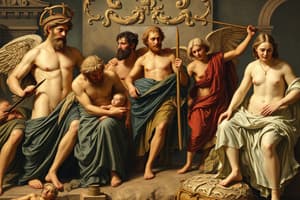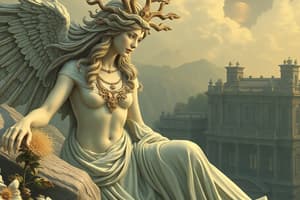Podcast
Questions and Answers
Which region is NOT typically included in the study of classical mythology, according to the provided definition?
Which region is NOT typically included in the study of classical mythology, according to the provided definition?
- Greece
- Rome
- Mesopotamia
- China (correct)
What characteristic is central to the definition of a myth, distinguishing it from other narratives?
What characteristic is central to the definition of a myth, distinguishing it from other narratives?
- Its multiple versions and repetition across generations (correct)
- Its transmission through a specific author
- Its basis in historical fact
- Its singular, unchanging form
How did the ancient Greeks perceive myths within their understanding of truth and narrative?
How did the ancient Greeks perceive myths within their understanding of truth and narrative?
- As interchangeable with philosophical arguments.
- As accurate historical accounts.
- As embodying the concept of logos or logical truth.
- As a form of mythos, separate from truth (logos) (correct)
What is a key factor that causes the variations in how a myth is told through time?
What is a key factor that causes the variations in how a myth is told through time?
How does the definition of 'mythology' in the context of this text relate to the concept of 'myth'?
How does the definition of 'mythology' in the context of this text relate to the concept of 'myth'?
What is one contrast between a myth and a fairy tale based on the text?
What is one contrast between a myth and a fairy tale based on the text?
What is a defining characteristic of an etiological myth?
What is a defining characteristic of an etiological myth?
Which of these best describes the nature of Greek gods?
Which of these best describes the nature of Greek gods?
What was the primary function of the Homeric hymns?
What was the primary function of the Homeric hymns?
What is the significance of the city of Delphi in ancient Greece?
What is the significance of the city of Delphi in ancient Greece?
Which of the following cultures is credited with inventing the first known system of writing?
Which of the following cultures is credited with inventing the first known system of writing?
What is the main geographical reason that ancient Greece was composed of many separate city-states?
What is the main geographical reason that ancient Greece was composed of many separate city-states?
In the context of ancient Greece, what is the Archaic Period primarily known for?
In the context of ancient Greece, what is the Archaic Period primarily known for?
What is the primary subject matter of Ovid's 'Ars Amatoria'?
What is the primary subject matter of Ovid's 'Ars Amatoria'?
Which literary work by Ovid consists of a collection of fictional letters written from the perspective of mythological heroines?
Which literary work by Ovid consists of a collection of fictional letters written from the perspective of mythological heroines?
During what historical period did Ovid write his major works?
During what historical period did Ovid write his major works?
Which significant theme is prevalent throughout Ovid's writings?
Which significant theme is prevalent throughout Ovid's writings?
What was the probable reason for Ovid's exile by Augustus?
What was the probable reason for Ovid's exile by Augustus?
In what geographical location was Ovid exiled?
In what geographical location was Ovid exiled?
Gods require what from humans?
Gods require what from humans?
Which of the following is a characteristic of oracles, as presented in the text?
Which of the following is a characteristic of oracles, as presented in the text?
Who were the Titans considered to be the children of?
Who were the Titans considered to be the children of?
In Mesopotamian mythology, what is Tiamat primarily associated with?
In Mesopotamian mythology, what is Tiamat primarily associated with?
Which of these gods is NOT considered a second-generation god in Mesopotamian mythology?
Which of these gods is NOT considered a second-generation god in Mesopotamian mythology?
What does the concept of 'Xenia' primarily represent in Greek mythology?
What does the concept of 'Xenia' primarily represent in Greek mythology?
What is a common theme found in both Mesopotamian and Hittite myths?
What is a common theme found in both Mesopotamian and Hittite myths?
According to the Mesopotamian flood myth, which god saves Ziusudra from the flood?
According to the Mesopotamian flood myth, which god saves Ziusudra from the flood?
In the Greek flood myth, how do Deucalion and Pyrrha repopulate the Earth?
In the Greek flood myth, how do Deucalion and Pyrrha repopulate the Earth?
What is the relationship between Hyperion and Helios in Greek mythology?
What is the relationship between Hyperion and Helios in Greek mythology?
In Hesiod's Theogony, what emerges from Chaos?
In Hesiod's Theogony, what emerges from Chaos?
How does Kronos become the ruler of the Titans?
How does Kronos become the ruler of the Titans?
What is unique about the Cyclopes as portrayed in Hesiod’s Theogony?
What is unique about the Cyclopes as portrayed in Hesiod’s Theogony?
Which deity is associated with the 'shaker of the earth' epithet?
Which deity is associated with the 'shaker of the earth' epithet?
Which of these figures was NOT a direct offspring of Zeus?
Which of these figures was NOT a direct offspring of Zeus?
Which goddess is most associated with overseeing marriage and women's fertility?
Which goddess is most associated with overseeing marriage and women's fertility?
What was the primary reason for Demeter's anger and subsequent neglect of the crops?
What was the primary reason for Demeter's anger and subsequent neglect of the crops?
Which titan is primarily known for his role of forelearner and benefactor of mankind?
Which titan is primarily known for his role of forelearner and benefactor of mankind?
What resulted from the competition between Athena and Poseidon for the patronage of Athens?
What resulted from the competition between Athena and Poseidon for the patronage of Athens?
Which god was known for his association with light, music, and prophecy?
Which god was known for his association with light, music, and prophecy?
What was the purpose of the 'Dios Apate' involving Hera and Zeus?
What was the purpose of the 'Dios Apate' involving Hera and Zeus?
Flashcards
Classical Mythology
Classical Mythology
Ancient stories from the Mediterranean, including Mesopotamia, Greece, and Rome, with a focus on Greek myths. It expanded beyond just Greece and Rome to include other ancient civilizations.
Myth
Myth
Traditional stories passed down through generations, with multiple versions, that emphasize repetition and essential story elements like plot, characters, conflict, and setting.
Mythology
Mythology
The study and analysis of myths, exploring their origins, variations, and cultural significance.
Logos
Logos
Signup and view all the flashcards
Mythos
Mythos
Signup and view all the flashcards
Myth Evolution
Myth Evolution
Signup and view all the flashcards
Etiological Myth
Etiological Myth
Signup and view all the flashcards
Polytheism
Polytheism
Signup and view all the flashcards
Anthropomorphic Gods
Anthropomorphic Gods
Signup and view all the flashcards
Homeric Hymns
Homeric Hymns
Signup and view all the flashcards
Oracles in Ancient Greece
Oracles in Ancient Greece
Signup and view all the flashcards
Mesopotamia
Mesopotamia
Signup and view all the flashcards
Sumer
Sumer
Signup and view all the flashcards
Ovid
Ovid
Signup and view all the flashcards
Metamorphoses
Metamorphoses
Signup and view all the flashcards
Ars Amatoria
Ars Amatoria
Signup and view all the flashcards
Titans
Titans
Signup and view all the flashcards
Oracles
Oracles
Signup and view all the flashcards
Sacrifice in Ancient Religion
Sacrifice in Ancient Religion
Signup and view all the flashcards
Augustus
Augustus
Signup and view all the flashcards
Roman Civil Wars
Roman Civil Wars
Signup and view all the flashcards
Roman Principate
Roman Principate
Signup and view all the flashcards
Gigantomachy
Gigantomachy
Signup and view all the flashcards
Hephaestus
Hephaestus
Signup and view all the flashcards
Demigod
Demigod
Signup and view all the flashcards
Kidnapping
Kidnapping
Signup and view all the flashcards
Mystery
Mystery
Signup and view all the flashcards
Prophecy
Prophecy
Signup and view all the flashcards
Pandora's Jar
Pandora's Jar
Signup and view all the flashcards
What is Xenia?
What is Xenia?
Signup and view all the flashcards
Who is Tiamat?
Who is Tiamat?
Signup and view all the flashcards
Who is Marduk?
Who is Marduk?
Signup and view all the flashcards
What is the Titanomachy?
What is the Titanomachy?
Signup and view all the flashcards
Who are the Titans?
Who are the Titans?
Signup and view all the flashcards
Who is Gaea?
Who is Gaea?
Signup and view all the flashcards
Who is Eros?
Who is Eros?
Signup and view all the flashcards
What is Chaos?
What is Chaos?
Signup and view all the flashcards
Who is Uranus?
Who is Uranus?
Signup and view all the flashcards
What is the Theogony?
What is the Theogony?
Signup and view all the flashcards
Study Notes
Classical Mythology Overview
- Classical mythology encompasses the ancient Mediterranean world, including Mesopotamia, Greece, and Rome, primarily focusing on Greek myths.
- This definition challenges the traditional European view, which limited classical mythology to Greece and Rome.
- Alternate definition is the ancient Mediterranean world, or "original cultures with cities," referencing six core civilizations: Egypt, Mesopotamia, Indus Valley, China, Mesoamerica, and Andes Mountains.
Definition of Myth and Mythology
- Myth is a traditional story, passed down through generations, with multiple versions, embodying elements typical of narratives (plot, characters, conflict, setting).
- Mythology is the study of such stories.
- Mythos (story) is contrasted with Logos (truth), with early Greeks viewing myths as narratives rather than factual explanations.
- Fairy tales are less repetitive and change with few versions.
Transmission and Variation of Myths
- Myths were transmitted orally before writing, with numerous tellers.
- Written versions exist, but they are varied interpretations.
- Changes reflect both tradition (consistent elements) and intentional variation.
Myth, Religion, and Polytheism
- Religion involves beliefs and actions based on those beliefs, whereas myths, though related, are not religions in themselves.
- Etiological myths explain the origins of things.
- Polytheism is central to mythology.
- Some deities represent concepts or abstractions.
- Gods are often anthropomorphic (human-like), born, and associated with specific places or concepts.
Homeric Hymns
- Homeric Hymns, composed after Homer, were meant for singing and ritual use.
- Heroes represented masculinity through nudity within these.
Nereids
- Nereids are fifty daughters of the sea god Nereus.
Oracles
- Oracles like the Pythia provided prophecies (often yes/no answers) within rituals involving sacrifices.
Mesopotamian Civilization
- Mesopotamia was an early southwestern Asian civilization, notable for its invention of cuneiform writing system using soft clay tablets.
- Located between the Tigris and Euphrates rivers (modern-day Iraq), it had multiple kingdoms and influential empires like Sumer and Akkadia.
- Mesopotamian myths influenced other cultures, including Greek myths.
Ancient Greece
- Ancient Greece comprised a collection of peninsulas and islands in the Mediterranean and Aegean seas.
- Its mountainous terrain made farming challenging and hindered unification.
- Greeks established colonies throughout the Mediterranean, Black Sea regions, and around the coast of Anatolia and Italy.
Phoenicians
- Phoenicians were significant colonizers in the Mediterranean, and influenced civilizations in the South.
Delphi
- Delphi was a significant religious center for the Greeks, housing an oracle of Apollo.
Roman Empire
- Roman Empire controlled vast territories around the Mediterranean, extending further inland than Greek colonies.
- Roman culture absorbed Greek traditions.
Chronological Periods
- Bronze Age (Mesopotamian and Egyptian cultures).
- Greek period, subdivided into:
- Archaic (invention of the Greek alphabet, Homer's epics).
- Classical (Golden Age of Athens, dramatic art, philosophy, history).
- Hellenistic (Conquests of Alexander the Great, Greek culture's expansion).
- Roman period.
Homer
- Homer's Iliad and Odyssey, set during the Trojan War, focus on the conflict between Greeks and Trojans (originating from the Judgement of Paris and the abduction of Helen).
- Iliad covers a 50-day period in the 9th year of a 10-year war; focusing on Achilles' anger with Agamemnon.
Hesiod
- Hesiod's Theogony details the genealogy of the gods.
- Hesiod's Works and Days focuses on the life of mortals in relation to labor.
Ovid
- Ovid's works, like Metamorphoses and Ars Amatoria, shaped the transition from post-classical to later periods.
General Mythological Information
- Titans: Children of Uranus and Gaea.
- Relationships among gods often involve humans and other deities, leading to demigods (heroes).
- Mesopotamian gods, like Tiamat, Anu, Ishtar, Enlil, Enki, and Utu, and their roles and relationships among gods across generations.
Anuma Elish
- Mesopotamian creation myth detailing the conflict between Marduk and Tiamat, highlighting themes of succession and creation from chaos to order.
Flood Myths
- Mesopotamian flood myths involve divine punishment for mankind. Stories of Ziusudra and Atrahasis are presented as surviving the flood, each with different levels of detail and emphasis.
- Greek flood myth, involving Lycaon's transgression (human sacrifice) leading to a divine flood and the survival of Deucalion and Pyrrha.
Helios
- Helios, the sun god, features in the story of Phaethon attempting to drive his father's chariot.
Aos
- Aos, in love with Tithonus, grants him immortality but not eternal youth, resulting in a tragic aging process.
Cosmogony and Theogony
- Cosmogony (origin of the universe) and Theogony (origin of the gods) are intertwined concepts.
- Creation from chaos, involving figures like Gaea, Uranus, Tartarus, and Eros.
- Genealogy of the Titans, their conflicts (Titanomachy), and the subsequent rise of the Olympians.
- Gigantomachy (battle between gods and giants) and Typhoeus, a monstrous figure.
Zeus
- Zeus, king of the gods, is associated with the sky, weather, male fertility, and order.
Poseidon
- Poseidon, god of the seas, earthquakes, and horses.
Hades
- Hades, god of the underworld.
Hera
- Hera, queen of the gods, associated with marriage, women's fertility, and domesticity.
Demeter
- Demeter, goddess of agriculture and harvest, and the kidnapping and return of Persephone.
- Eleusinian Mysteries, a significant religious cult associated with Demeter.
Moerae
- Moerae (Fates) dictate human and divine lifespans and destinies.
Hestia
- Goddess of the hearth and home; honorable but less active in the pantheon compared to some of the other gods.
Prometheus
- Prometheus, a Titan, is known for bringing fire to humanity, leading to conflict with Zeus.
Pandora
- Pandora, the first woman, is associated with the introduction of evils to humanity.
Apollo
- Apollo, god of prophecy, healing, music, and light.
- Apollo's role in the Delphic oracle.
Hephaestus
- Hephaestus, god of metalworking and craftsmanship, was often depicted as lame and unattractive, though possessing great technological skill.
Ares
- Ares, god of war.
Hermes
- Hermes, messenger god of the gods, known for his trickery and speed; patron of travelers, merchants, thieves.
Aphrodite
- Aphrodite, goddess of love and beauty.
Artemis
- Artemis, goddess of the hunt, wilderness, and childbirth.
Athena
- Athena, goddess of wisdom, warfare, and crafts, particularly associated with Athens.
- Athena's role in the conflict for Athens, and the creation of the Parthenon.
Studying That Suits You
Use AI to generate personalized quizzes and flashcards to suit your learning preferences.





